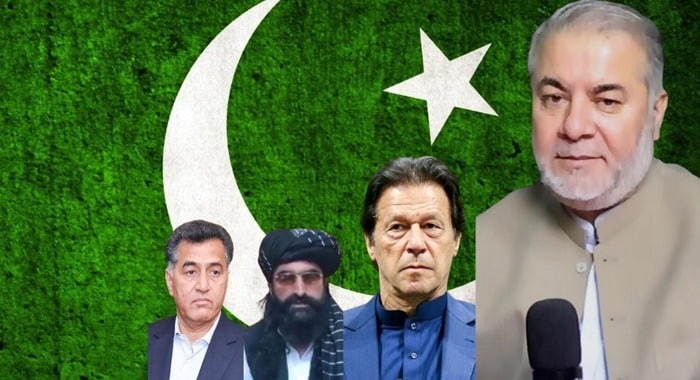Mushtaq Yusufzai
The fight against terrorism in Pakistan has long been marked by contrasting approaches, political confusion, and a lack of consistent long-term strategy. A glaring example of this is the policy divide between the federal government and the Khyber Pakhtunkhwa (KP) provincial administration regarding the Tehreek-e-Taliban Pakistan (TTP).
From the onset, the federal government maintained that many militants, including those from the TTP, operate from Afghan soil and have strong cross-border linkages. The current federal stance is rooted in rejecting negotiations with such elements and pursuing them through military means, citing their direct involvement in orchestrating violence and terrorism across the country. This is in stark contrast to the KP provincial government’s approach, especially under the leadership of Chief Minister Ali Amin Gandapur, who has openly stated intentions to initiate dialogue with the TTP—even proposing to send a delegation to Afghanistan, independently of Islamabad’s policy.
This divergence has serious implications. The federal government has consistently opposed talks with the TTP, pointing to past failures. For instance, in 2014, the then government did attempt peace talks with the Taliban, even forming a committee. However, those talks collapsed, eventually leading to Operation Zarb-e-Azb in North Waziristan—a landmark military offensive targeting all terrorist groups including TTP and Al-Qaeda. The operation pushed most banned outfits across the border into Afghanistan, establishing relative peace for the first time in years.
However, peace was short-lived. When the PTI government came to power in 2021–22, it revived negotiations with the TTP. A ceasefire was established, but no meaningful disarmament occurred. According to a briefing by a senior corps commander during the caretaker setup in KP, between 6,000 and 8,000 TTP militants returned from Afghanistan during that ceasefire. This reinfiltration, according to the same source, triggered a resurgence of violence, particularly in KP. The return of militants brought sleeper cells back into action, leading to targeted attacks on law enforcement, especially in southern KP where the security situation remains precarious.
Despite this reality, the KP provincial leadership appears hesitant to take a firm stance. Torn between addressing the militancy threat and preserving what many view as a political affinity with the TTP—stemming from the group’s perceived soft corner for Imran Khan’s PTI—the KP government has failed to offer a coherent counterterrorism policy. Even the proposed delegation to Afghanistan has remained mere rhetoric.
This disjointed approach is not just a matter of political posturing—it directly affects the lives of citizens. In recent months, TTP activity has been reported in places like District Karak, an area previously unaffected by militancy. This expansion of militant influence shows that the issue is spreading geographically, and it requires immediate unified action.
Furthermore, attributing the growing violence to intelligence failures is simplistic. As observed in rural areas, police officers are deeply embedded in the communities—they live among us, travel by bicycle or motorcycle, and their schedules are publicly known. This makes them soft targets. However, major attacks such as the one on the Peshawar Police Lines indicate something more sinister—clear security lapses and possible insider involvement. Subsequent investigations and JIT findings confirmed that insiders within the police aided the attackers. These high-profile breaches cannot be ignored or dismissed as routine failures.
In the midst of these challenges, baseless claims are also circulated to score political points. One such claim alleged that 40,000 militants were resettled in Pakistan during the Imran-Faiz period. This assertion was debunked by reliable briefings that confirmed the number to be between 6,000 and 8,000—figures that are still alarming but must be acknowledged with accuracy, not sensationalism. An example of the dangers of misinformation was also evident in a development project by the SRSP in Kalam, Swat, where a project worth half a million rupees was falsely accused of millions in corruption—an allegation disproved by basic math.
The core of the issue lies in the absence of a unified national counterterrorism policy. Political parties must stop using militancy as a tool for blame games or image management. Short-term operations, without follow-through or long-term planning, have repeatedly failed to deliver sustained peace. Pakistan cannot afford this cycle any longer.
Both federal and provincial governments share equal responsibility for ensuring security and peace. However, given the current scale of violence in KP, the provincial government must take immediate and firm action. Meanwhile, the federal government must provide full support—military, logistical, and financial—to KP’s counterterrorism efforts. Without this synergy, militants will continue to exploit political rifts, expand their influence, and destabilize the region.
Pakistan’s history shows that military operations alone cannot win the war against terror, but peace talks without accountability or enforcement are equally futile. The solution lies in coordinated, evidence-based, and non-partisan policymaking—rooted not in appeasement, but in justice, security, and the rule of law.





